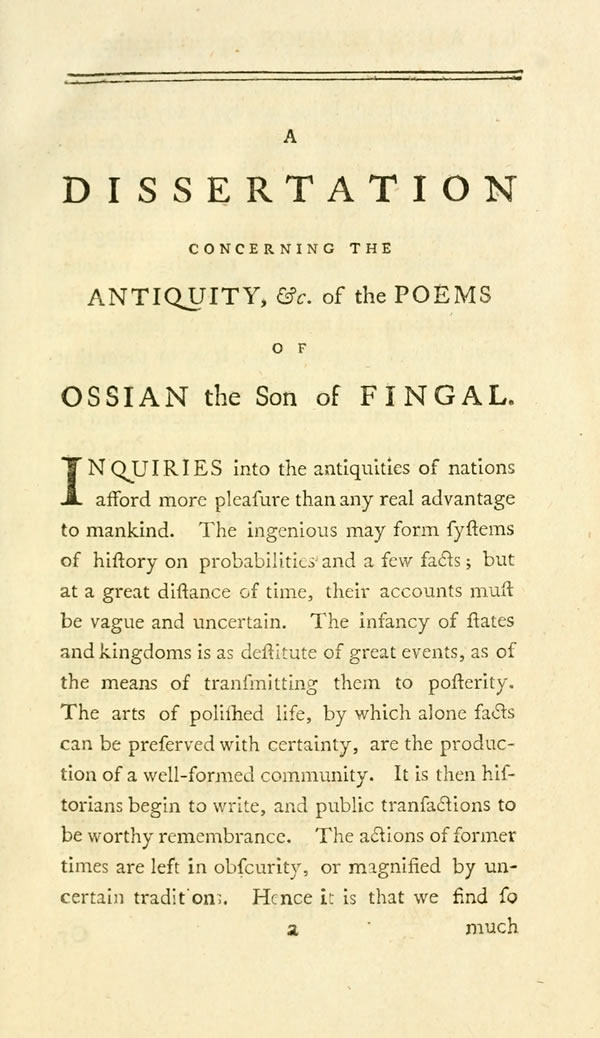
A
Dissertation
Concerning the
Antiquity, &c.
of the Poems of
Ossian the Son of Fingal.
Inquiries into the antiquities of nations afford more pleasure
than any real advantage to mankind. The ingenious may form systems of history on
probabilities and a few facts; but at a great distance of time, their accounts must be
vague and uncertain. The infancy of states and kingdoms is as destitute of great events,
as of the means of transmitting them to posterity. The arts of polished life, by which
alone facts can be preserved with certainty, are the production of a well-formed
community. It is then historians begin to write, and public transactions to be worthy
remembrance. The actions of former times are left in obscurity, or magnified by uncertain
traditions. Hence it is that we find so
[
ii
]
View Page Image much of the marvellous in the origin of every nation; posterity being always ready to
believe any thing, however fabulous, that reflects honour on their ancestors. The Greeks
and Romans were remarkable for this weakness. They swallowed the most absurd fables
concerning the high antiquities of their respective nations. Good historians, however,
rose very early amongst them, and transmitted, with lustre, their great actions to
posterity. It is to them that they owe that unrivalled fame they now enjoy, while the
great actions of other nations are involved in fables, or lost in obscurity. The Celtic
nations afford a striking instance of this kind. They, though once the masters of Europe
from the mouth of the river ObyDisplay note, in Russia, to Cape
Finisterre, the western point of Gallicia in Spain, are very little mentioned in history.
They trusted their fame to tradition and the songs of their bards, which, by the
vicissitude of human affairs, are long since lost. Their ancient language is the only
monument that remains of them; and the traces of it being found in places so widely
distant of each other, serves only to shew the extent of their ancient power, but throws
very little light on their history.
much of the marvellous in the origin of every nation; posterity being always ready to
believe any thing, however fabulous, that reflects honour on their ancestors. The Greeks
and Romans were remarkable for this weakness. They swallowed the most absurd fables
concerning the high antiquities of their respective nations. Good historians, however,
rose very early amongst them, and transmitted, with lustre, their great actions to
posterity. It is to them that they owe that unrivalled fame they now enjoy, while the
great actions of other nations are involved in fables, or lost in obscurity. The Celtic
nations afford a striking instance of this kind. They, though once the masters of Europe
from the mouth of the river ObyDisplay note, in Russia, to Cape
Finisterre, the western point of Gallicia in Spain, are very little mentioned in history.
They trusted their fame to tradition and the songs of their bards, which, by the
vicissitude of human affairs, are long since lost. Their ancient language is the only
monument that remains of them; and the traces of it being found in places so widely
distant of each other, serves only to shew the extent of their ancient power, but throws
very little light on their history.

Of all the Celtic nations, that which possessed old Gaul is the most renowned; not perhaps on account of worth superior to the rest, but for their wars with a people who had historians to transmit the fame of their enemies, as well as their own, to posterity. Britain was first peopled by them, according to the testimony of the best authors, its situation in respect to Gaul makes the opinion probable; but what puts it beyond all dispute, is that the same customs and language prevailed among the inhabitants of both in the days of Julius Cæsar.Display note
The colony from Gaul possessed themselves, at first, of that
part of Britain which was next to their own country; and spreading northward, by degrees,
as they increased in numbers, peopled the whole island. Some adventurers passing over from
those parts of Britain that are within sight of Ireland, were the founders of the Irish
nation: which is a more probable story than the idle fables of Milesian and Gallician
colonies. Diodorus SiculusDisplay note mentions it as a
thing well known in his time, that the inhabitants of Ireland were originally Britons; and
his testimony is unquestionable, when we consider
[
iv
]
View Page Image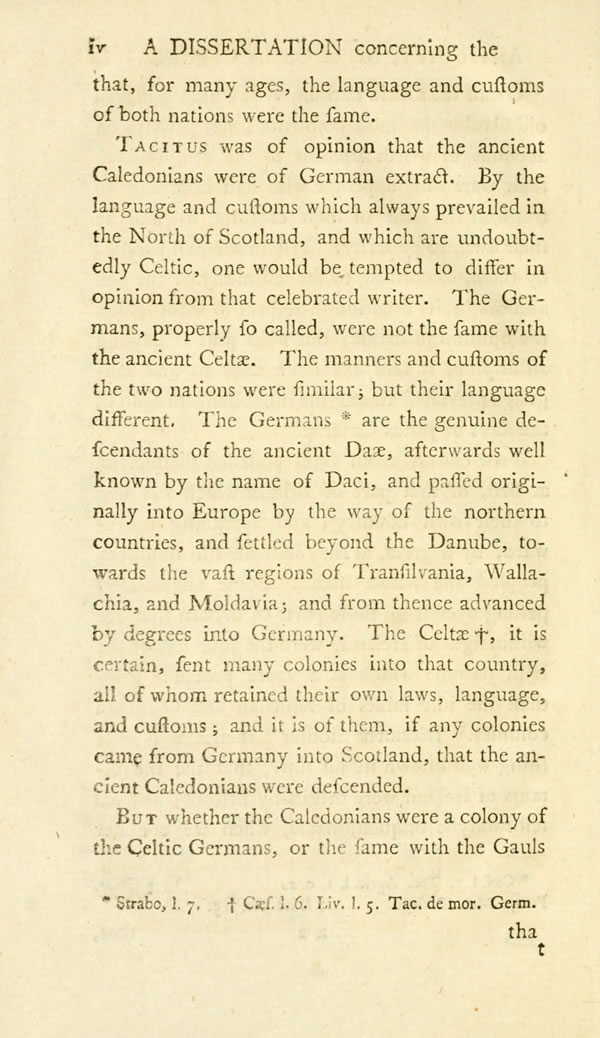 that, for many ages, the language and customs
of both nations were the same.
that, for many ages, the language and customs
of both nations were the same.
Tacitus was of opinion that the ancient Caledonians were of German extract. By the language and customs which always prevailed in the North of Scotland, and which are undoubtedly Celtic, one would be tempted to differ in opinion from that celebrated writer. The Germans, properly so called, were not the same with the ancient Celtæ. The manners and customs of the two nations were similar; but their language different. The GermansDisplay note are the genuine descendants of the ancient Daæ, afterwards well known by the name of Daci, and passed originally into Europe by the way of the northern countries, and settled beyond the Danube, towards the vast regions of Transilvania, Wallachia, and Moldavia; and from thence advanced by degrees into Germany. The CeltæDisplay note, it is certain, sent many colonies into that country, all of whom retained their own laws, language, and customs; and it is of them, if any colonies came from Germany into Scotland, that the ancient Caledonians were descended.
But whether the Caledonians were a colony of the Celtic
Germans, or the same with the Gauls
[
v
]
View Page Image that
first possessed themselves of Britain, is a matter of no moment at this distance of time.
Whatever their origin was, we find them very numerous in the time of Julius Agricola,
which is a presumption that they were long before settled in the country. The form of
their government was a mixture of aristocracy and monarchy, as it was in all the countries
where the Druids bore the chief sway. This order of men seems to have been formed on the
same system with the Dactyli Idæi and Curetes of the ancients. Their pretended
intercourse with heaven, their magic and divination were the same. The knowledge of the
Druids in natural causes, and the properties of certain things, the fruit of the
experiments of ages gained them a mighty reputation among the people. The esteem of the
populace soon increased into a veneration for the order; which a cunning and ambitious
tribe of men took care to improve, to such a degree, that they, in a manner, ingrossed the
management of civil, as well as religious, matters. It is generally allowed that they did
not abuse this extraordinary power; the preserving their character of sanctity was so
essential to their influence, that they never broke out into violence or oppression. The
chiefs were allowed to execute the laws, but the legislative power was entirely
[
vi
]
View Page Image
that
first possessed themselves of Britain, is a matter of no moment at this distance of time.
Whatever their origin was, we find them very numerous in the time of Julius Agricola,
which is a presumption that they were long before settled in the country. The form of
their government was a mixture of aristocracy and monarchy, as it was in all the countries
where the Druids bore the chief sway. This order of men seems to have been formed on the
same system with the Dactyli Idæi and Curetes of the ancients. Their pretended
intercourse with heaven, their magic and divination were the same. The knowledge of the
Druids in natural causes, and the properties of certain things, the fruit of the
experiments of ages gained them a mighty reputation among the people. The esteem of the
populace soon increased into a veneration for the order; which a cunning and ambitious
tribe of men took care to improve, to such a degree, that they, in a manner, ingrossed the
management of civil, as well as religious, matters. It is generally allowed that they did
not abuse this extraordinary power; the preserving their character of sanctity was so
essential to their influence, that they never broke out into violence or oppression. The
chiefs were allowed to execute the laws, but the legislative power was entirely
[
vi
]
View Page Image in the hands of the DruidsDisplay note. It was by their authority that the tribes were united, in times
of the greatest danger, under one head. This temporary king, or VergobretusDisplay note, was chosen
by them, and generally laid down his office at the end of the war. These priests enjoyed
long this extraordinary privilege among the Celtic nations who lay beyond the pale of the
Roman empire. It was in the beginning of the second century that their power among the
Caledonians begun to decline. The poems that celebrate Trathal and Cormac, ancestors to
Fingal, are full of particulars concerning the fall of the Druids, which account for the
total silence concerning their religion in the poems that are now given to the public.
in the hands of the DruidsDisplay note. It was by their authority that the tribes were united, in times
of the greatest danger, under one head. This temporary king, or VergobretusDisplay note, was chosen
by them, and generally laid down his office at the end of the war. These priests enjoyed
long this extraordinary privilege among the Celtic nations who lay beyond the pale of the
Roman empire. It was in the beginning of the second century that their power among the
Caledonians begun to decline. The poems that celebrate Trathal and Cormac, ancestors to
Fingal, are full of particulars concerning the fall of the Druids, which account for the
total silence concerning their religion in the poems that are now given to the public.
The continual wars of the Caledonians against the Romans
hindered the nobility from initiating themselves, as the custom formerly was, into the
order of the Druids. The precepts of their religion were confined to a few, and were not
much attended to by a people inured to war. The Vergobretus, or chief magistrate, was
chosen without the concurrence of the hierarchy, or continued in his office against their
will. Continual power strengthened his interest among
[
vii
]
View Page Image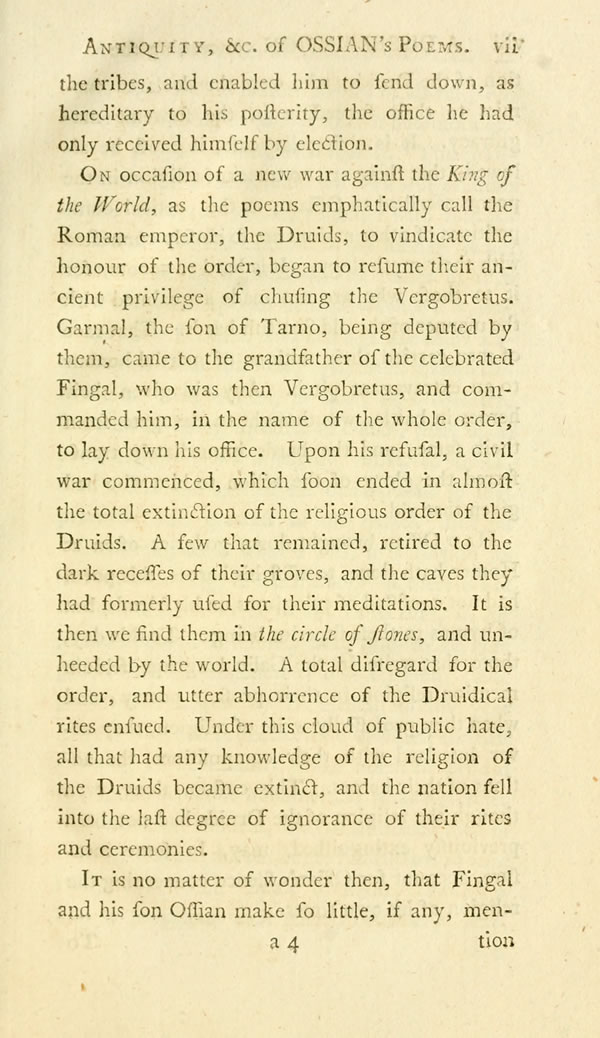 the tribes, and enabled him to send down, as
hereditary to his posterity, the office he had only received himself by election.
the tribes, and enabled him to send down, as
hereditary to his posterity, the office he had only received himself by election.
On occasion of a new war against the King of the World, as the poems emphatically call the Roman emperor, the Druids, to vindicate the honour of the order, began to resume their ancient privilege of chusing the Vergobretus. Garmal, the son of Tarno, being deputed by them, came to the grandfather of the celebrated Fingal, who was then Vergobretus, and commanded him, in the name of the whole order, to lay down his office. Upon his refusal, a civil war commenced, which soon ended in almost the total extinction of the religious order of the Druids. A few that remained, retired to the dark recesses of their groves, and the caves they had formerly used for their meditations. It is then we find them in the circle of stones, and unheeded by the world. A total disregard for the order, and utter abhorrence of the Druidical rites ensued. Under this cloud of public hate, all that had any knowledge of the religion of the Druids became extinct, and the nation fell into the last degree of ignorance of their rites and ceremonies.
It is no matter of wonder then, that Fingal and his son Ossian
make so little, if any, mention
[
viii
]
View Page Image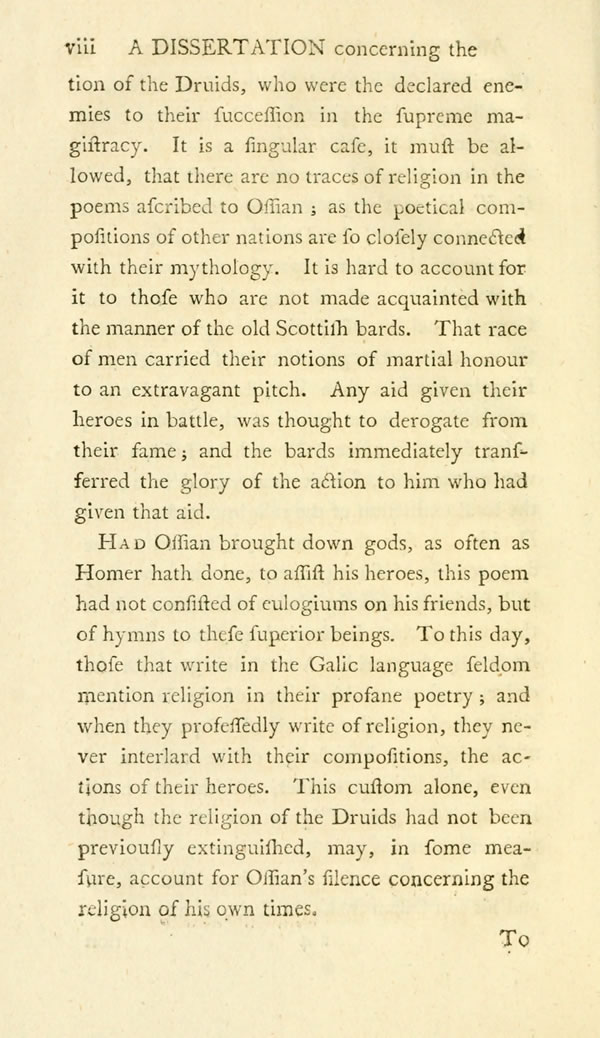 of
the Druids, who were the declared enemies to their succesion in the supreme magistracy. It
is a singular case, it must be allowed, that there are no traces of religion in the poems
ascribed to Ossian; as the poetical compositions of other nations are so closely connected
with their mythology. It is hard to account for it to those who are not made acquainted
with the manner of the old Scottish bards. That race of men carried their notions of
martial honour to an extravagant pitch. Any aid given their heroes in battle, was thought
to derogate from their fame; and the bards immediately transferred the glory of the action
to him who had given that aid.
of
the Druids, who were the declared enemies to their succesion in the supreme magistracy. It
is a singular case, it must be allowed, that there are no traces of religion in the poems
ascribed to Ossian; as the poetical compositions of other nations are so closely connected
with their mythology. It is hard to account for it to those who are not made acquainted
with the manner of the old Scottish bards. That race of men carried their notions of
martial honour to an extravagant pitch. Any aid given their heroes in battle, was thought
to derogate from their fame; and the bards immediately transferred the glory of the action
to him who had given that aid.
Had Ossian brought down gods, as often as Homer hath done, to assist his heroes, this poem had not consisted of elogiums on his friends, but of hymns to these superior beings. To this day, those that write in the Galic language seldom mention religion in their profane poetry; and when they professedly write of religion, they never interlard with their compositions, the actions of their heroes. This custom alone, even though the religion of the Druids had not been previously extinguished, may, in some measure, account for Ossian's silence concerning the religion of his own times.
[ ix ] View Page Image
To say, that a nation is void of all religion, is the same
thing as to say, that it does not consist of people endued with reason. The traditions of
their fathers, and their own observations on the works of nature, together with that
superstition which is inherent in the human frame, have, in all ages, raised in the minds
of men some idea of a superior being.—Hence it is, that in the darkest times, and
amongst the most barbarous nations, the very populace themselves had some faint notion, at
least, of a divinity. It would be doing injustice to Ossian, who, upon no occasion, shews
a narrow mind, to think, that he had not opened his conceptions to that primitive and
greatest of all truths. But let Ossian's religion be what it will, it is certain he had no
knowledge of Christianity, as there is not the least allusion to it, or any of its rites,
in his poems; which absolutely fixes him to an æra prior to the introduction of that
religion. The persecution begun by Dioclesian, in the year 303, is the most probable time
in which the first dawning of Christianity in the north of Britain can be
fixed.—The humane and mild character of Constantius Chlorus, who commanded then in
Britain, induced the persecuted Christians to take refuge under him. Some of them, through
a zeal to propagate their tenets, or through fear,
[
x
]
View Page Image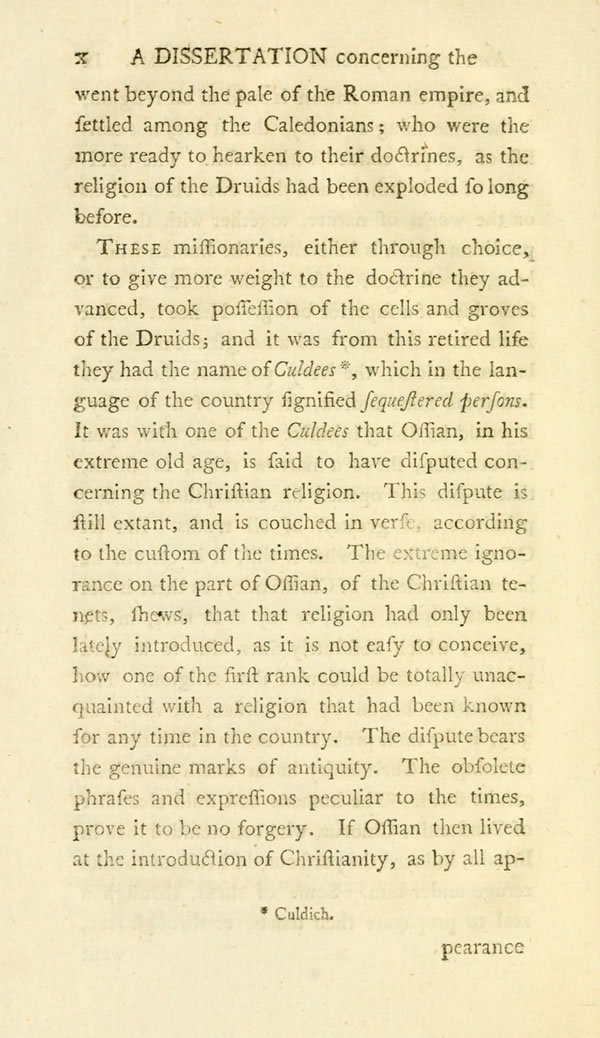 went beyond the pale of the Roman empire, and
settled among the Caledonians; who were the more ready to hearken to their doctrines, as
the religion of the Druids had been exploded so long before.
went beyond the pale of the Roman empire, and
settled among the Caledonians; who were the more ready to hearken to their doctrines, as
the religion of the Druids had been exploded so long before.
These missionaries, either through choice, or to give more
weight to the doctrine they advanced, took possession of the cells and groves of the
Druids; and it was from this retired life they had the name of CuldeesDisplay note, which in the language of the country
signified sequestered persons. It was with one of the Culdees that Ossian, in his extreme old age, is said to have disputed
concerning the Christian religion. This dispute is still extant, and is couched in verse,
according to the custom of the times. The extreme ignorance on the part of Ossian, of the
Christian tenets, shews, that that religion had only been lately introduced, as it is not
easy to conceive, how one of the first rank could be totally unacquainted with a religion
that had been known for any time in the country. The dispute bears the genuine marks of
antiquity. The obsolete phrases and expressions peculiar to the times, prove it to be no
forgery. If Ossian then lived at the introduction of Christianity, as by all appearance
[
xi
]
View Page Image he did, his epoch will be the latter end
of the third, and beginning of the fourth century. What puts this point beyond dispute, is
the allusion in his poems to the history of the times.
he did, his epoch will be the latter end
of the third, and beginning of the fourth century. What puts this point beyond dispute, is
the allusion in his poems to the history of the times.
The exploits of Fingal against CaraculDisplay note, the son of the King of the World, are among the first brave actions of his youth. A complete poem, which relates to this subject, is printed in this collection.
In the year 210 the emperor Severus, after returning from his
expeditions against the Caledonians, at York fell into the tedious illness of which he
afterwards died. The Caledonians and Maiatæ, resuming courage from his indisposition,
took arms in order to recover the possessions they had lost. The enraged emperor commanded
his army to march into their country, and to destroy it with fire and sword. His orders
were but ill executed, for his son, Caracalla, was at the head of the army, and his
thoughts were entirely taken up with the hopes of his father's death, and with schemes to
supplant his brother Geta.—He scarcely had entered the enemy's country, when news
was
[
xii
]
View Page Image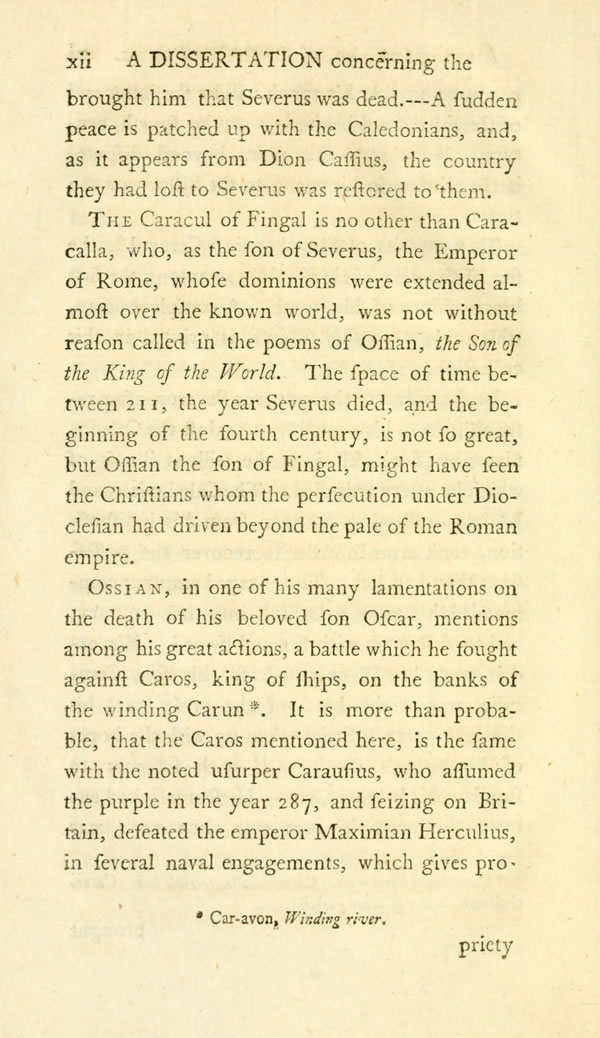 brought him that Severus was
dead.—A sudden peace is patched up with the Caledonians, and, as it appears from
Dion Cassius, the country they had lost to Severus was restored to them.
brought him that Severus was
dead.—A sudden peace is patched up with the Caledonians, and, as it appears from
Dion Cassius, the country they had lost to Severus was restored to them.
The Caracul of Fingal is no other than Caracalla, who, as the son of Severus, the Emperor of Rome, whose dominions were extended almost over the known world, was not without reason called in the poems of Ossian, the Son of the King of the World. The space of time between 211, the year Severus died, and the beginning of the fourth century, is not so great, but Ossian the son of Fingal, might have seen the Christians whom the persecution under Dioclesian had driven beyond the pale of the Roman empire.
Ossian, in one of his many lamentations on the death of his
beloved son Oscar, mentions among his great actions, a battle which he fought against
Caros, king of ships, on the banks of the winding CarunDisplay note. It is more than probable, that the Caros
mentioned here, is the same with the noted usurper Carausius, who assumed the purple in
the year 287, and seizing on Britain, defeated the emperor Maximian Herculius, in several
naval engagements, which gives propriety
[
xiii
]
View Page Image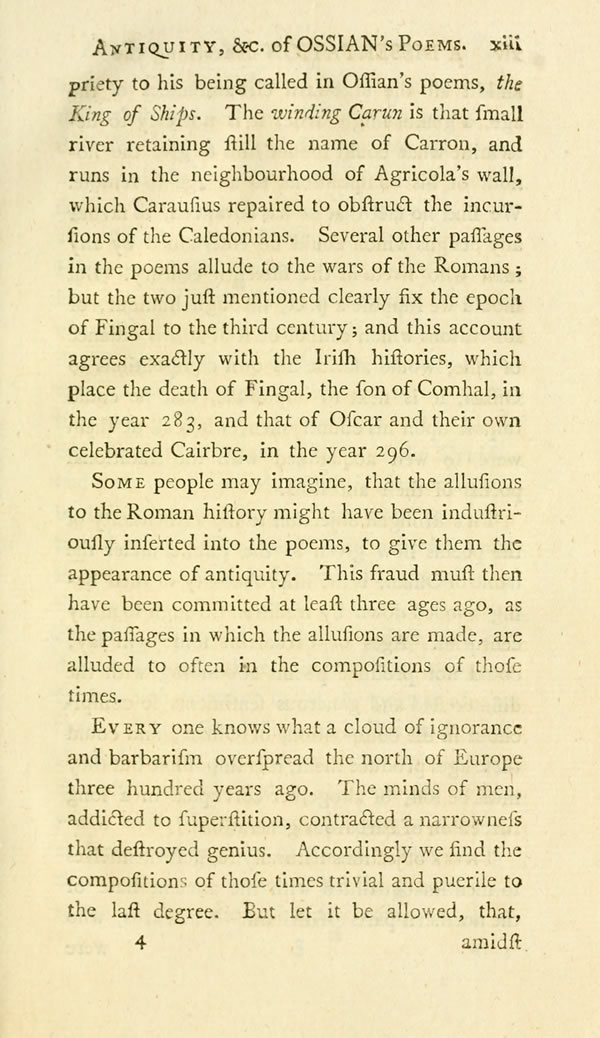 to his being called in Ossian's poems, the King of Ships. The winding Carun is that
small river retaining still the name of Carron, and runs in the neighbourhood of
Agricola's wall, which Carausius repaired to obstruct the incursions of the Caledonians.
Several other passages in the poems allude to the wars of the Romans; but the two just
mentioned clearly fix the epoch of Fingal to the third century; and this account agrees
exactly with the Irish histories, which place the death of Fingal, the son of Comhal, in
the year 283, and that of Oscar and their own celebrated Cairbre, in the year 296.
to his being called in Ossian's poems, the King of Ships. The winding Carun is that
small river retaining still the name of Carron, and runs in the neighbourhood of
Agricola's wall, which Carausius repaired to obstruct the incursions of the Caledonians.
Several other passages in the poems allude to the wars of the Romans; but the two just
mentioned clearly fix the epoch of Fingal to the third century; and this account agrees
exactly with the Irish histories, which place the death of Fingal, the son of Comhal, in
the year 283, and that of Oscar and their own celebrated Cairbre, in the year 296.
Some people may imagine, that the allusions to the Roman history might have been industriously inserted into the poems, to give them the appearance of antiquity. This fraud must then have been committed at least three ages ago, as the passages in which the allusions are made, are alluded to often in the compositions of those times.
Every one knows what a cloud of ignorance and barbarism
overspread the north of Europe three hundred years ago. The minds of men, addicted to
superstition, contracted a narrowness that destroyed genius. Accordingly we find the
compositions of those times trivial and puerile to the last degree. But let it be allowed,
that,
[
xiv
]
View Page Image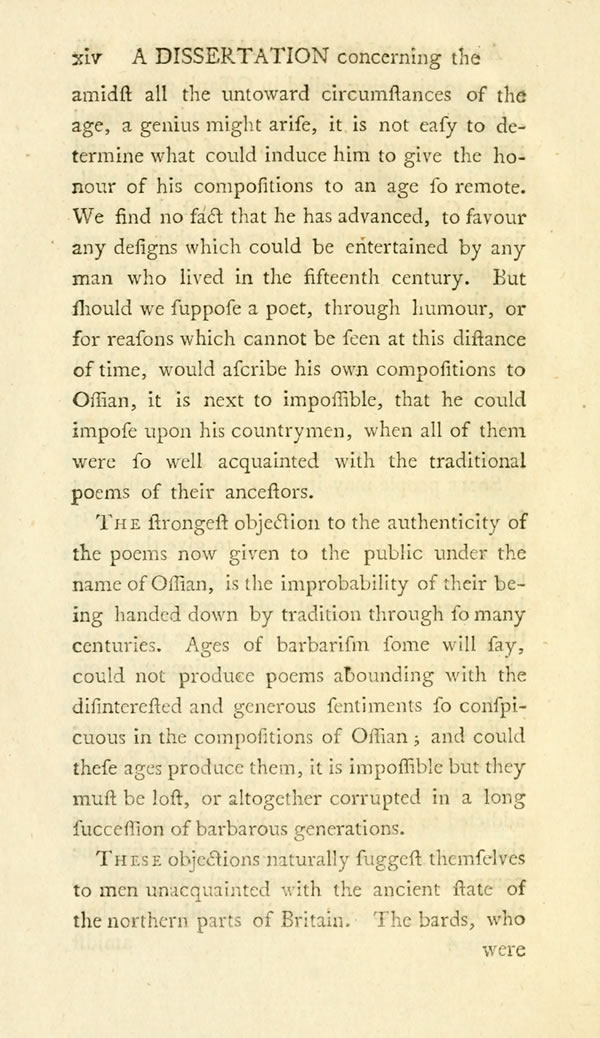 amidst all the untoward
circumstances of the age, a genius might arise, it is not easy to determine what could
induce him to give the honour of his compositions to an age so remote. We find no fact
that he has advanced, to favour any designs which could be entertained by any man who
lived in the fifteenth century. But should we suppose a poet, through humour, or for
reasons which cannot be seen at this distance of time, would ascribe his own compositions
to Ossian, it is next to impossible, that he could impose upon his countrymen, when all of
them were so well acquainted with the traditional poems of their ancestors.
amidst all the untoward
circumstances of the age, a genius might arise, it is not easy to determine what could
induce him to give the honour of his compositions to an age so remote. We find no fact
that he has advanced, to favour any designs which could be entertained by any man who
lived in the fifteenth century. But should we suppose a poet, through humour, or for
reasons which cannot be seen at this distance of time, would ascribe his own compositions
to Ossian, it is next to impossible, that he could impose upon his countrymen, when all of
them were so well acquainted with the traditional poems of their ancestors.
The strongest objection to the authenticity of the poems now given to the public under the name of Ossian, is the improbability of their being handed down by tradition through so many centuries. Ages of barbarism some will say, could not produce poems abounding with the disinterested and generous sentiments sο conspicuous in the compositions of Ossian; and could these ages produce them, it is impossible but they must be lost, or altogether corrupted in a long succession of barbarous generations.
These objections naturally suggest themselves to men
unacquainted with the ancient state of the northern parts of Britain. The bards, who
[
xv
]
View Page Image were an inferior order of the Druids,
did not share their bad fortune. They were spared by the victorious king, as it was
through their means only he could hope for immortality to his fame. They attended him in
the camp, and contributed to establish his power by their songs. His great actions were
magnified, and the populace, who had no ability to examine into his character narrowly,
were dazzled with his fame in the rhimes of the bards. In the mean time, men affirmed
sentiments that are rarely to be met with in an age of barbarism. The bards who were
originally the disciples of the Druids, had their minds opened, and their ideas enlarged,
by being initiated in the learning of that celebrated order. They could form a perfect
hero in their own minds, and ascribe that character to their prince. The inferior chiefs
made this ideal character the model of their conduct, and by degrees brought their minds
to that generous spirit which breathes in all the poetry of the times. The prince,
flattered by his bards, and rivalled by his own heroes, who imitated his character as
described in the eulogies of his poets, endeavoured to excel his people in merit, as he
was above them in station. This emulation continuing, formed at last the general character
of the nation, happily compounded of
[
xvi
]
View Page Image
were an inferior order of the Druids,
did not share their bad fortune. They were spared by the victorious king, as it was
through their means only he could hope for immortality to his fame. They attended him in
the camp, and contributed to establish his power by their songs. His great actions were
magnified, and the populace, who had no ability to examine into his character narrowly,
were dazzled with his fame in the rhimes of the bards. In the mean time, men affirmed
sentiments that are rarely to be met with in an age of barbarism. The bards who were
originally the disciples of the Druids, had their minds opened, and their ideas enlarged,
by being initiated in the learning of that celebrated order. They could form a perfect
hero in their own minds, and ascribe that character to their prince. The inferior chiefs
made this ideal character the model of their conduct, and by degrees brought their minds
to that generous spirit which breathes in all the poetry of the times. The prince,
flattered by his bards, and rivalled by his own heroes, who imitated his character as
described in the eulogies of his poets, endeavoured to excel his people in merit, as he
was above them in station. This emulation continuing, formed at last the general character
of the nation, happily compounded of
[
xvi
]
View Page Image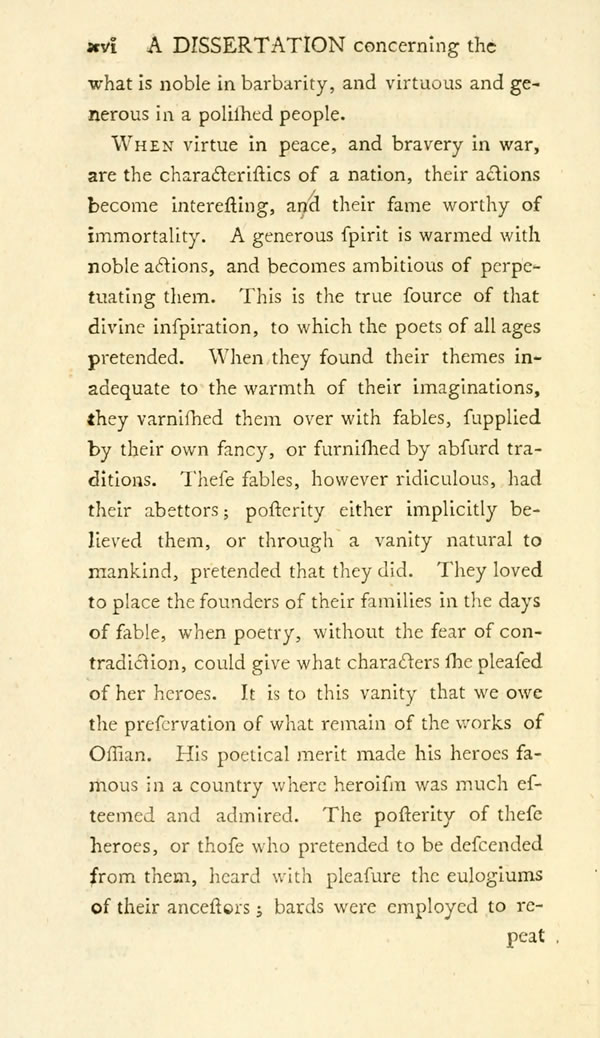 what is noble in barbarity, and virtuous and generous in a polished people.
what is noble in barbarity, and virtuous and generous in a polished people.
When virtue in peace, and bravery in war, are the
characteristics of a nation, their actions become interesting, and their fame worthy of
immortality. A generous spirit is warmed with noble actions, and becomes ambitious of
perpetuating them. This is the true source of that divine inspiration, to which the poets
of all ages pretended. When they found their themes inadequate to the warmth of their
imaginations, they varnished them over with fables, supplied by their own fancy, or
furnished by absurd traditions. These fables, however ridiculous, had their abettors;
posterity either implicitly believed them, or through a vanity natural to mankind,
pretended that they did. They loved to place the founders of their families in the days of
fable, when poetry, without the fear of contradiction, could give what characters she
pleased of her heroes. It is to this vanity that we owe the preservation of what remain of
the works of Ossian. His poetical merit made his heroes famous in a country where heroism
was much esteemed and admired. The posterity of these heroes, or those who pretended to be
descended from them, heard with pleasure the eulogiums of their ancestors; bards were
employed to repeat
[
xvii
]
View Page Image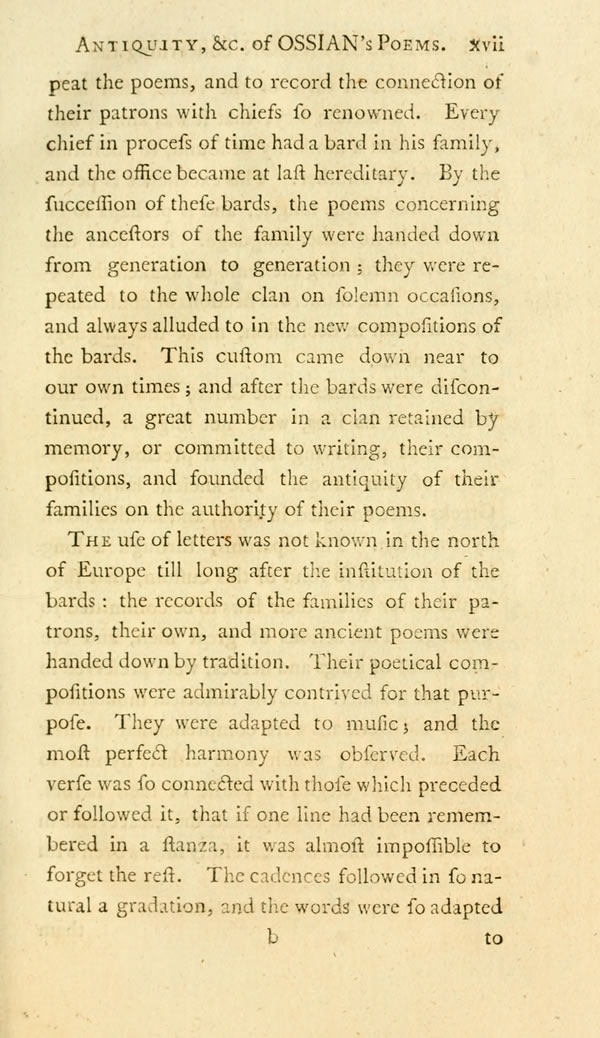 the poems, and to
record the connection of their patrons with chiefs so renowned. Every chief in process of
time had a bard in his family, and the office became at last hereditary. By the succession
of these bards, the poems concerning the ancestors of the family were handed down from
generation to generation; they were repeated to the whole clan on solemn occasions, and
always alluded to in the new compositions of the bards. This custom came down near to our
own times; and after the bards were discontinued, a great number in a clan retained by
memory, or committed to writing, their compositions, and founded the antiquity of their
families on the authority of their poems.
the poems, and to
record the connection of their patrons with chiefs so renowned. Every chief in process of
time had a bard in his family, and the office became at last hereditary. By the succession
of these bards, the poems concerning the ancestors of the family were handed down from
generation to generation; they were repeated to the whole clan on solemn occasions, and
always alluded to in the new compositions of the bards. This custom came down near to our
own times; and after the bards were discontinued, a great number in a clan retained by
memory, or committed to writing, their compositions, and founded the antiquity of their
families on the authority of their poems.
The use of letters was not known in the North of Europe till
long after the institution of the bards: the records of the families of their patrons,
their own, and more ancient poems were handed down by tradition. Their poetical
compositions were admirably contrived for that purpose. They were adapted to music; and
the most perfect harmony observed. Each verse was so connected with those which preceded
or followed it, that if one line had been remembered in a stanza, it was almost impossible
to forget the rest. The cadences followed in so natural a gradation, and the words were sο
adapted
[
xviii
]
View Page Image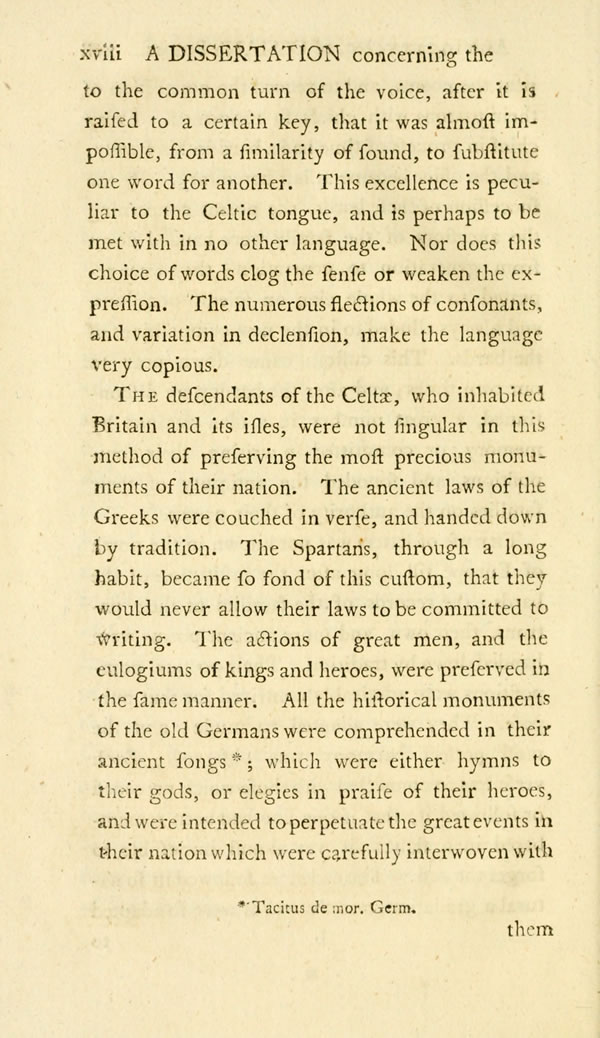 to the common turn of the
voice, after it is raised to a certain key, that it was almost impossible, from a
similarity of sound, to substitute one word for another. This excellence is peculiar to
the Celtic tongue, and is perhaps to be met with in no other language. Nor does this
choice of words clog the sense or weaken the expression. The numerous flections of
consonants, and variation in declension, make the language very copious.
to the common turn of the
voice, after it is raised to a certain key, that it was almost impossible, from a
similarity of sound, to substitute one word for another. This excellence is peculiar to
the Celtic tongue, and is perhaps to be met with in no other language. Nor does this
choice of words clog the sense or weaken the expression. The numerous flections of
consonants, and variation in declension, make the language very copious.
The descendants of the Celtæ, who inhabited Britain and
its isles, were not singular in this method of preserving the most precious monuments of
their nation. The ancient laws of the Greeks were couched in verse, and handed down by
tradition. The Spartans, through a long habit, became so fond of this custom, that they
would never allow their laws to be committed to writing. The actions of great men, and the
elogiums of kings and heroes were preserved in the same manner. All the historical
monuments of the old Germans were comprehended in their ancient songsDisplay note; which were either hymns to their gods, or elegies in
praise of their heroes, and were intended to perpetuate the great events in their nation
which were carefully interwoven with
[
xix
]
View Page Image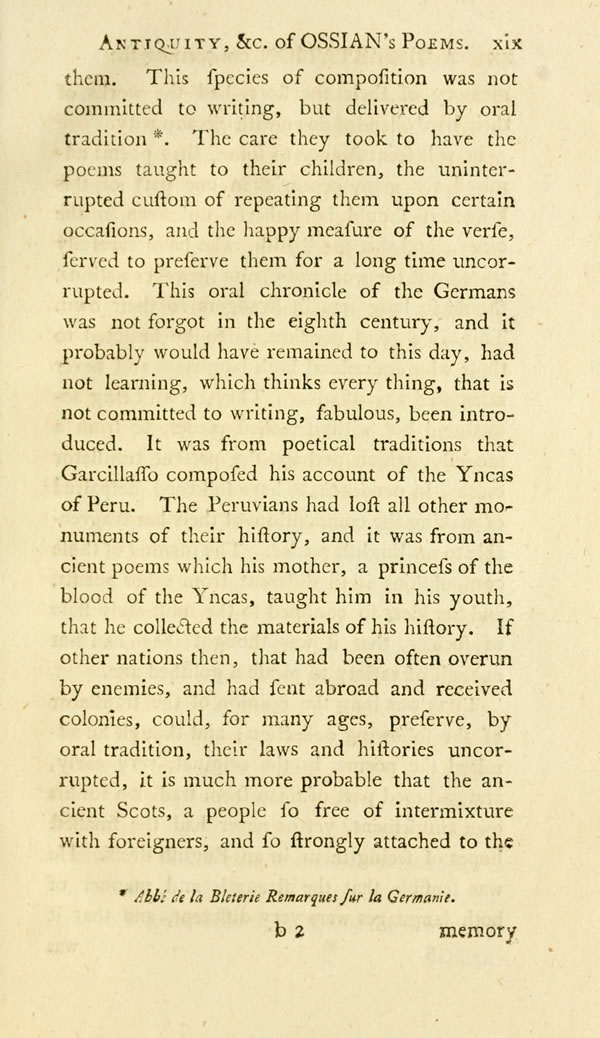 them. This species of composition was not committed to writing, but delivered by oral
traditionDisplay note. The care they took to have the poems taught to
their children, the uninterrupted custom of repeating them upon certain occasions, and the
happy measure of the verse, served to preserve them for a long time uncorrupted. This oral
chronicle of the Germans was not forgot in the eighth century, and it probably would have
remained to this day, had not learning, which thinks every thing, that is not committed to
writing, fabulous, been introduced. It was from poetical traditions that Garcillasso
composed his account of the Yncas of Peru. The Peruvians had lost all other monuments of
their history, and it was from ancient poems which his mother, a princess of the blood of
the Yncas, taught him in his youth, that he collected the materials of his history. If
other nations then, that had been often overun by enemies, and had sent abroad and
received colonies, could, for many ages, preserve, by oral tradition, their laws and
histories uncorrupted, it is much more probable that the ancient Scots, a people so free
of intermixture with foreigners, and so strongly attached to the
[
xx
]
View Page Image
them. This species of composition was not committed to writing, but delivered by oral
traditionDisplay note. The care they took to have the poems taught to
their children, the uninterrupted custom of repeating them upon certain occasions, and the
happy measure of the verse, served to preserve them for a long time uncorrupted. This oral
chronicle of the Germans was not forgot in the eighth century, and it probably would have
remained to this day, had not learning, which thinks every thing, that is not committed to
writing, fabulous, been introduced. It was from poetical traditions that Garcillasso
composed his account of the Yncas of Peru. The Peruvians had lost all other monuments of
their history, and it was from ancient poems which his mother, a princess of the blood of
the Yncas, taught him in his youth, that he collected the materials of his history. If
other nations then, that had been often overun by enemies, and had sent abroad and
received colonies, could, for many ages, preserve, by oral tradition, their laws and
histories uncorrupted, it is much more probable that the ancient Scots, a people so free
of intermixture with foreigners, and so strongly attached to the
[
xx
]
View Page Image memory of their ancestors, had the works of
their bards handed down with great purity.
memory of their ancestors, had the works of
their bards handed down with great purity.
It will seem strange to some, that poems admired for many centuries in one part of this kingdom should be hitherto unknown in the other; and that the British, who have carefully traced out the works of genius in other nations, should so long remain strangers to their own. This, in a great measure, is to be imputed to those who understood both languages and never attempted a translation. They, from being acquainted but with detached pieces, or from a modesty, which perhaps the present translator ought, in prudence, to have followed, despaired of making the compositions of their bards agreeable to an English reader. The manner of those compositions is so different from other poems, and the ideas so confined to the most early state of society, that it was thought they had not enough of variety to please a polished age.
This was long the opinion of the translator of the following
collection; and though he admired the poems, in the original, very early, and gathered
part of them from tradition for his own amusement, yet he never had the smallest hopes of
seeing them in an English dress. He was sensible that the strength and manner of both
languages were very different, and that it
[
xxi
]
View Page Image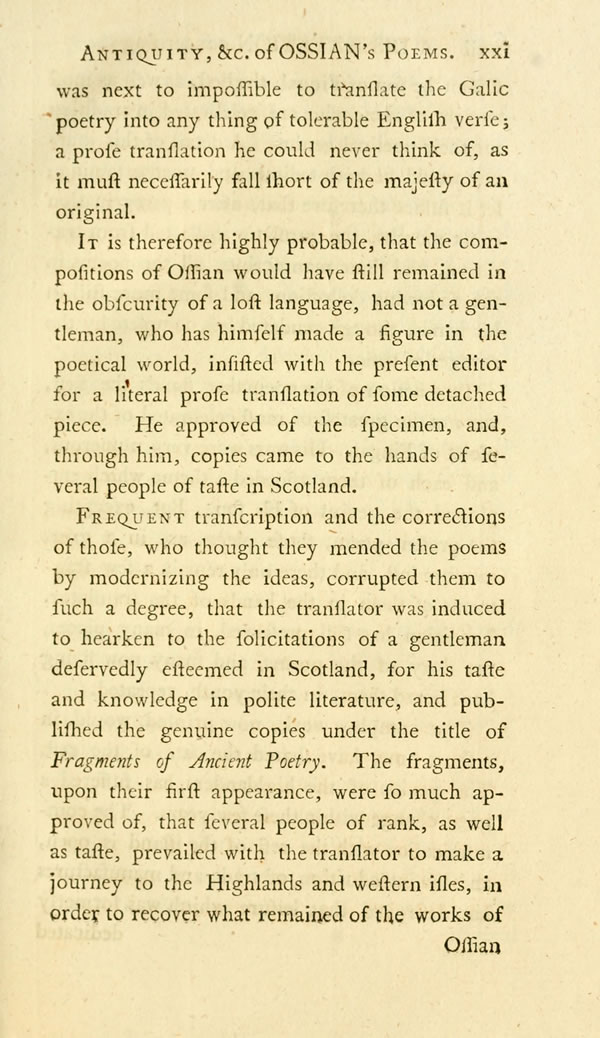 was next to impossible to translate the Galic
poetry into any thing of tolerable English verse; a prose translation he could never think
of, as it must necessarily fall short of the majesty of an original.
was next to impossible to translate the Galic
poetry into any thing of tolerable English verse; a prose translation he could never think
of, as it must necessarily fall short of the majesty of an original.
It is therefore highly probable that the compositions of Ossian would have still remained in the obscurity of a lost language, had not a gentleman, who has himself made a figure in the poetical world, insisted with the present editor for a literal prose translation of some detached piece. He approved of the specimen and, through him, copies came to the hands of several people of taste in Scotland.
Frequent transcription and the corrections of those, who
thought they mended the poems by modernizing the ideas, corrupted them to such a degree,
that the translator was induced to hearken to the solicitations of a gentleman deservedly
esteemed in Scotland, for his taste and knowledge in polite literature, and published the
genuine copies under the title of Fragments of Ancient Poetry. The
fragments, upon their first appearance, were so much approved of, that several people of
rank, as well as taste, prevailed with the translator to make a journey to the Highlands
and western isles, in order to recover what remained of the works of
[
xxii
]
View Page Image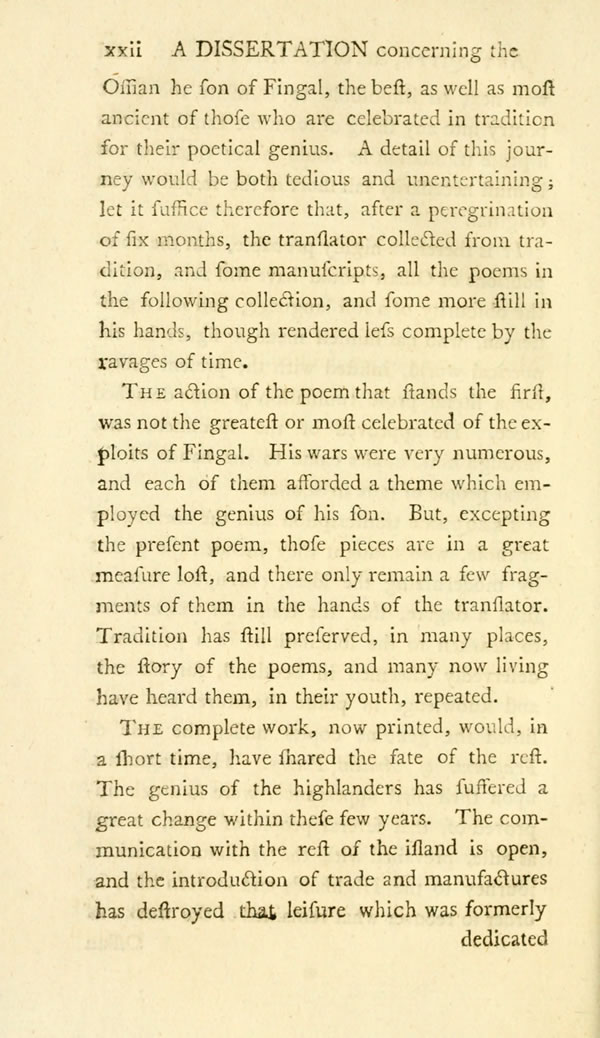 Ossian the son of Fingal, the best, as well as
most ancient of those who are celebrated in tradition for their poetical genius. A detail
of this journey would be both tedious and unentertaining; let is suffice therefore that,
after a peregrination of six months, the translator collected from tradition, and some
manuscripts, all the poems in the following collection, and some more still in his hands,
though rendered less complete by the ravages of time.
Ossian the son of Fingal, the best, as well as
most ancient of those who are celebrated in tradition for their poetical genius. A detail
of this journey would be both tedious and unentertaining; let is suffice therefore that,
after a peregrination of six months, the translator collected from tradition, and some
manuscripts, all the poems in the following collection, and some more still in his hands,
though rendered less complete by the ravages of time.
The action of the poem that stands the first, was not the greatest or most celebrated of the exploits of Fingal. His wars were very numerous, and each of them afforded a theme which employed the genius of his son. But, excepting the present poem, those pieces are in a great measure lost, and there only remain a few fragments of them in the hands of the translator. Tradition has still preserved, in many places, the story of the poems, and many now living have heard them, in their youth, repeated.
The complete work, now printed, would, in a short time, have
shared the fate of the rest. The genius of the highlanders has suffered a great change
within these few years. The communication with the rest of the island is open, and the
introduction of trade and manufactures has destroyed that leisure which was formerly
[
xxiii
]
View Page Image dedicated to hearing and repeating
the poems of ancient times. Many have now learned to leave their mountains, and seek their
fortunes in a milder climate; and though a certain amor patriæ
may sometimes bring them back, they have, during their absence, imbibed enough of foreign
manners to despise the customs of their ancestors. Bards have been long disused, and the
spirit of genealogy has greatly subsided. Men begin to be less devoted to their chiefs,
and consanguinity is not so much regarded. When property is established, the human mind
confines its views to the pleasure it procures. It does not go back to antiquity, or look
forward to succeeding ages. The cares of life increase, and the actions of other times no
longer amuse. Hence it is, that the taste for their ancient poetry is at a low ebb among
the highlanders. They have not, however, thrown off the good qualities of their ancestors.
Hospitality still subsists, and an uncommon civility to strangers. Friendship is
inviolable, and revenge less blindly followed than formerly.
dedicated to hearing and repeating
the poems of ancient times. Many have now learned to leave their mountains, and seek their
fortunes in a milder climate; and though a certain amor patriæ
may sometimes bring them back, they have, during their absence, imbibed enough of foreign
manners to despise the customs of their ancestors. Bards have been long disused, and the
spirit of genealogy has greatly subsided. Men begin to be less devoted to their chiefs,
and consanguinity is not so much regarded. When property is established, the human mind
confines its views to the pleasure it procures. It does not go back to antiquity, or look
forward to succeeding ages. The cares of life increase, and the actions of other times no
longer amuse. Hence it is, that the taste for their ancient poetry is at a low ebb among
the highlanders. They have not, however, thrown off the good qualities of their ancestors.
Hospitality still subsists, and an uncommon civility to strangers. Friendship is
inviolable, and revenge less blindly followed than formerly.
To speak of the poetical merit of the poems, would be an
anticipation on the judgment of the public: And all that can be said of the translation,
is, that it is literal, and that simplicity is studied. The arrangement of the words in
the
[
xxiv
]
View Page Image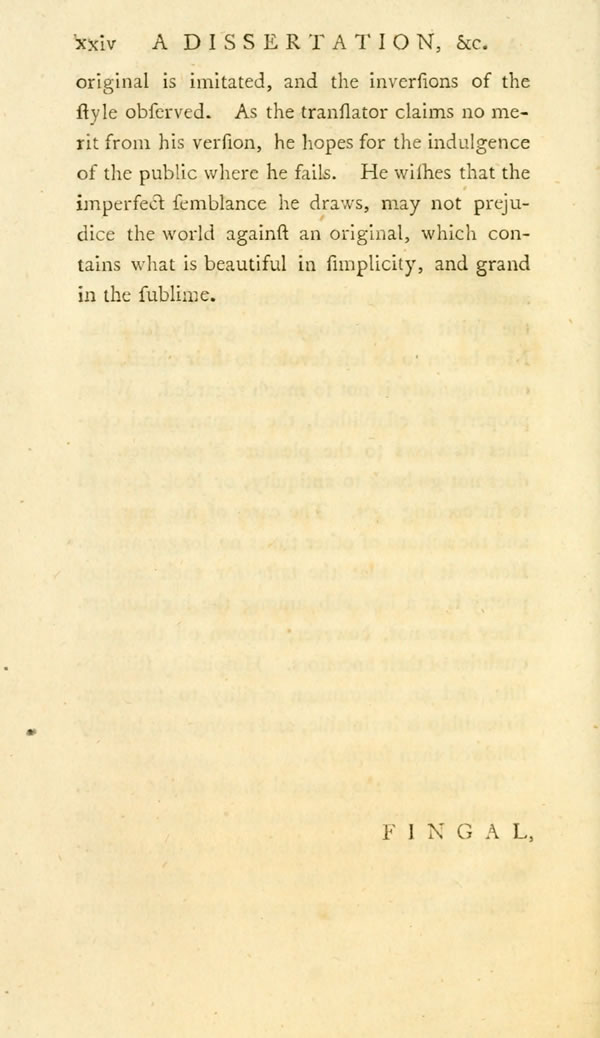 original is imitated, and the
inversions of the style observed. As the translator claims no merit from his version, he
hopes for the indulgence of the public where he fails. He wishes that the imperfect
semblance he draws, may not prejudice the world against an original, which contains what
is beautiful in simplicity, and grand in the sublime.
original is imitated, and the
inversions of the style observed. As the translator claims no merit from his version, he
hopes for the indulgence of the public where he fails. He wishes that the imperfect
semblance he draws, may not prejudice the world against an original, which contains what
is beautiful in simplicity, and grand in the sublime.

